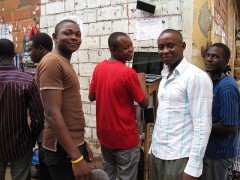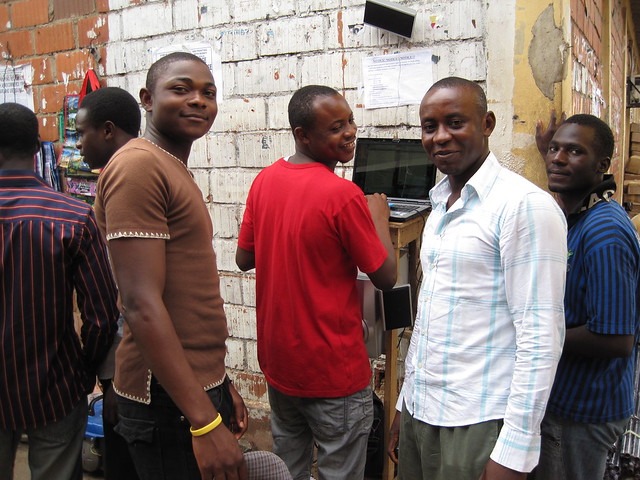Nigeria: Hobbling the Entrepreneuerial Spirit


Nigerian ICT Entrepreneurs: Anything Digitized in Wuse market. Credit: Wayan Vota. (CC BY-NC-SA 2.0)
In today’s economy, it is vital that young people learn to fish for themselves rather than wait to be handed fish by their guardians or society. Yet it is even better to be able to fish and sell for a profit on the open market.
Why?
Because young people can then decide to sell cod, calamari, prawns, trout or whatever fish they choose, based on the needs in their various markets, each of which has its different challenges and profit margins.
Every day we hear reports about the increasing number of jobs now available and how young people should take advantage of these new opportunities and be useful to themselves and their societies. Yet the average person who has received countless ‘we’re sorry but there was someone else better qualified/ the position has already been filled/you were unsuccessful on this occasion’ letters not only knows different but decides to be different (if they are smart).
We call people who decide to fish for themselves entrepreneurs. Austrian economist Joseph Schumpeter’s definition of ‘entrepreneurship’ puts its emphasis on innovation and signals out new products, new production methods, new markets, and new methods of organization.
‘New’ is the key word in the definition; not tried and tested, not ‘operating since 1881’. People are naturally afraid of change and that in itself becomes the first hurdle an entrepreneur has to scale after they opened shop.
Not that opening shop is any easier.
The four major kinds of challenges or handicaps facing young would-be entrepreneurs in Nigeria are given below. Some of them apply to other countries only in differing degrees.
Infrastructure: Power. Roads. Office space. Running an office you’ve had to cough out two years rent on with a generator doesn’t leave much small change for innovation. Add to this the inconvenience of transport (the horrors of seriously potholed roads if you’re not in the centre of a major city) and you might be discouraged even more.
Education: Are entrepreneurial courses taught in schools? Can we exchange one of the General Studies (GST) courses for Entrepreneurship 101? The truth is that because most young entrepreneurs start out from ‘need’ or excitement alone, they don’t have the knowledge they require to be able to stay the course. There is no education about comprehensive business plans, risk management, sourcing markets and being adaptable to changing trends. Sometimes there isn’t even proper information on market rules and regulations which means that ignorant young business start-ups flout these rules royally and are doomed to fail before they even take off.
Finance: Raising venture capital is one of the hardest bits. The young person may be bursting with energy and be blessed with vigorous entrepreneurial spirit, but the inability to commit ideas to paper in a coherent and feasible manner is the reason why many such business ideas never get beyond the drawing board. Also, young people lack credentials and collateral, and it’s only recently that banks have moved from loaning money on collateral to buying equity. And once again, most of the requirements are beyond the reach of young investors.
Support: Access to mentors, training, and other support groups can be daunting for young people. The support groups might not exist or they’re too busy competing with each other, or young people might be simply unaware of their existence.
It’s easy for politicians, academics, and motivational speakers to challenge young people to take the lead and drive their economies by starting out on their own. But we need to stop riding that huge wave of sentimental froth and start implementing targeted policies and creating a supportative environment that will actually give us a fighting chance.
Tags: business, entrepreneur, Joseph Schumpeter, Nigeria, road, Small business, Support group, youth

